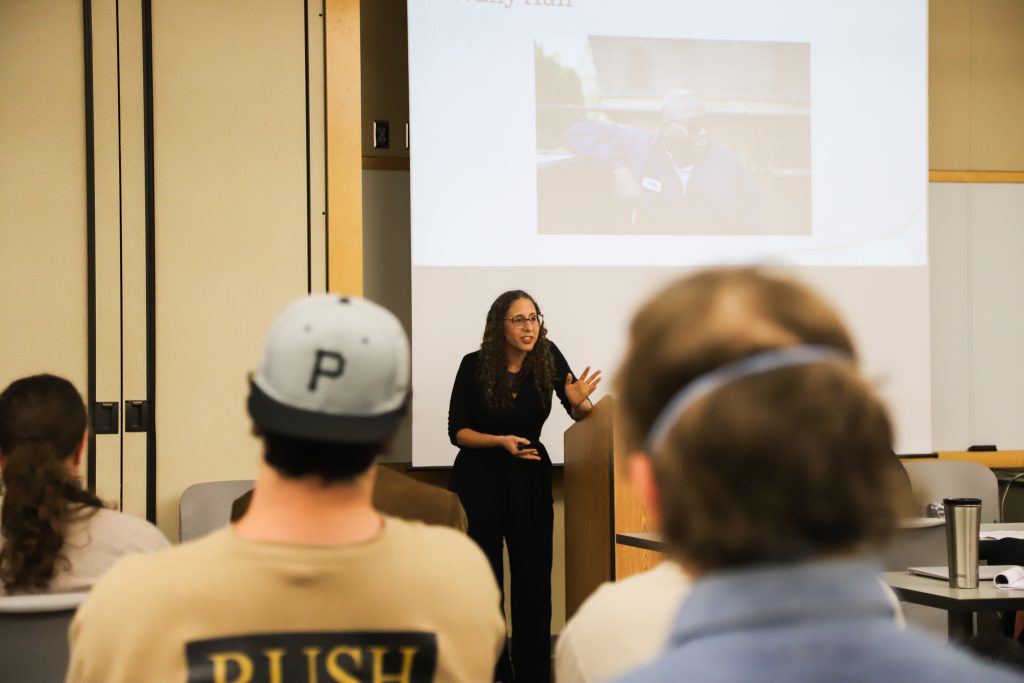Farah Stockman, a renowned Pulitzer Prize-winning journalist who serves on the New York Times Editorial Board, visited Binghamton University on Thursday to speak about her career and research.
The talk, “What Happens to Workers and Communities When Jobs Disappear,” was the concluding lecture in a series organized by the master of science in human rights program in memory of Lubna Chaudhry, an associate professor of human development who was integral to the program’s founding.
It was co-sponsored by the local University United Professions chapter, the Human Rights Institute, the Human Development Association, the National Association for the Advancement of Colored People, the Latin American Student Union, the Powerful United Ladies Striving to Elevate and the women, gender and sexuality studies, economics, sociology and Africana studies departments.
Stockman was introduced by Suzy Lee, the master program’s director, and Maribel Tineo, a visiting assistant professor in the human development department. Tineo recalled how she met Stockman when they worked together at Harvard University’s Phillip Brooks House Mission Hill Afterschool Program under SUNY Chancellor John B. King, Jr., who was in attendance Thursday night.
The lecture centered around Stockman’s 2021 book, “American Made: What Happens to People When Work Disappears,” which she wrote over the four years of former President Donald Trump’s term. Motivated by a question of why Trump had been elected, Stockman, a Michigan native, began talking to voters and hearing their concerns.
She heard one constant concern — jobs. Trump, she said, had tapped into an anger that went unseen by much of America’s political class.
“One of my big [takeaways] from the whole experience is that we have such a divide between those who make policies, [talk] about the policies and everybody else who has to live under those policies,” Stockman said. “There’s a huge divide geographically, economically and educationally to the point where there had been a whole war against blue-collar work for a generation, and we didn’t even know it was going on. We didn’t even know that we were part of the group that was waging it.”
Stockman’s book followed three individuals employed at an Indianapolis manufacturing plant, an intimate look at their lives before and after the factory closed. She shared that the writing process had shown her “one of the greatest divides in our country is [an] educational divide.”
In an anecdote about Shannon, a single mother who was the first woman to run a dangerous furnace, Stockman referred to a “blue-collar feminism” — an endurance and strength embodying the practical, everyday perseverance of the working class. Addressing skepticism she had faced when writing the book, she said believing in democracy meant that “you’ve got to listen to voters wherever they are.”
Stockman said she had almost titled her book “One of Us,” referencing a recurring concept at the heart of Trump’s victory. Jobs, intrinsically tied to civil rights and human dignity, are the clearest sign of where loyalties truly lie, she argued.
“Jobs are an expression of political loyalty,” Stockman said. “They are like a part of politics, and if you understand that, the sort of tribal nature the way that people give jobs, to their loyalists and their family members and their compatriots. Then you understand why there was so much rage when factories started moving out of the American midwest to places like Mexico and China. People saw that they had been sold out by their politicians.”
Ending on an optimistic note, Stockman noted increased investments in American infrastructure under President Joe Biden and a resurgent labor movement under the “most pro-labor National Labor Relations Board, probably in history.”
After completing her undergraduate coursework at Harvard, Stockman began her journalism career reporting on Kenya’s presidential election and the international tribunal established in the aftermath of the Rwandan genocide.
Before joining the Times, Stockman worked at the Boston Globe, where she reported on foreign policy, wrote columns and contributed to the paper’s editorial board. A six-month series focusing on the nuanced legacy of court-mandated busing in Boston won her the Pulitzer Prize in Commentary in 2016.
René Rojas, an assistant professor in the human development department, described why the program chose Stockman to conclude this year’s lecture series, which centered around organized labor and the role of worker insurgencies in promoting justice. He said her selection fit Chaudhry’s vision for the human rights graduate program — an expanded vision of civil rights that includes economic justice and the labor movement.
“Pretty much every society on the planet violates human rights on a massive scale,” Rojas said. “Most people don’t have dignified work. Most people don’t have dignified housing in our country. Tens of millions of people don’t have health insurance and health coverage.”
Despite the heavy responsibility of writing about harrowing human tragedy, Stockman told Pipe Dream she tries to find hope in every story and center them on authentic human experience.
“I do think human stories and hopeful stories are the best way to engage readers,” Stockman said.



